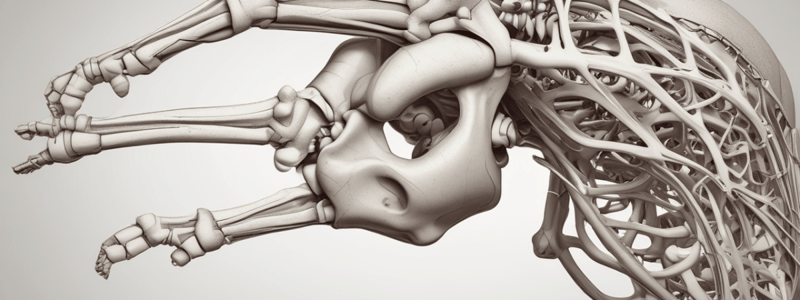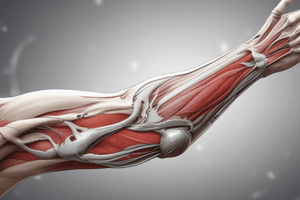Podcast
Questions and Answers
What is the type of synovial joint found at the elbow?
What is the type of synovial joint found at the elbow?
- Condyloid joint
- Saddle joint
- Pivot joint
- Hinge joint (correct)
Which of the following muscles does not produce a hinge movement at the elbow?
Which of the following muscles does not produce a hinge movement at the elbow?
- Triceps brachii
- Brachialis (correct)
- Branchioradialis
- Biceps brachii
What is the purpose of the oblique band of the ulnar collateral ligament?
What is the purpose of the oblique band of the ulnar collateral ligament?
- Stabilizing the proximal radioulnar joint
- Strengthening the medial aspect of the joint capsule
- Deepening the socket for the trochlea (correct)
- Facilitating flexion of the elbow
What is the relationship between the ulna and humerus at full extension of the elbow?
What is the relationship between the ulna and humerus at full extension of the elbow?
Which ligament blends with the annular ligament at the elbow?
Which ligament blends with the annular ligament at the elbow?
What is the characteristic of the joint capsule at the elbow?
What is the characteristic of the joint capsule at the elbow?
What is the characteristic of the carrying angle of the forearm?
What is the characteristic of the carrying angle of the forearm?
What is the main function of the interosseous membrane in the forearm?
What is the main function of the interosseous membrane in the forearm?
What is the term for the complete loss of contact of the joint surfaces?
What is the term for the complete loss of contact of the joint surfaces?
What is the structure that separates the cavity of the distal radioulnar joint from the wrist cavity?
What is the structure that separates the cavity of the distal radioulnar joint from the wrist cavity?
Which muscle is responsible for supination of the forearm?
Which muscle is responsible for supination of the forearm?
What is the term for the condition in which the head of the radius subluxates from the annular ligament?
What is the term for the condition in which the head of the radius subluxates from the annular ligament?
What is the structure that attaches to the ulna and forms a ligamentous collar around the radial notch?
What is the structure that attaches to the ulna and forms a ligamentous collar around the radial notch?
What is the joint that articulates the distal radius and articular disk with the proximal carpal bones?
What is the joint that articulates the distal radius and articular disk with the proximal carpal bones?
What is the term for the partial dislocation of a joint, where the bone ends are misaligned but still in contact?
What is the term for the partial dislocation of a joint, where the bone ends are misaligned but still in contact?
Flashcards are hidden until you start studying
Study Notes
The Elbow and Joints of the Forearm
- The elbow joint is a hinge type synovial joint that allows for flexion and extension movements.
- At full extension, the ulna makes an angle of 170º with the humerus (long axis), and the forearm is angled further away from the trunk in females.
- The muscles involved in producing hinge movements at the elbow are:
- Biceps brachii
- Triceps brachii
- Brachioradialis
Capsule and Ligaments of the Elbow
- The elbow joint capsule is weak anteriorly and posteriorly, but strengthened by collateral ligaments medially and laterally.
- The ulnar collateral ligament has three bands: anterior (strongest), posterior, and oblique (deepens the socket for the trochlea).
- The radial collateral ligament is fan-like and blends with the annular ligament.
Bursae of the Elbow
- There are several bursae associated with the elbow joint, including:
- Subcutaneous olecranon bursa
- Subtendinous olecranon bursa
Neurovascular Supply of the Elbow
- The radial nerve passes anterior to the lateral epicondyle, while the ulnar nerve passes posterior to the medial epicondyle.
- Hilton's law states that the neurovascular supply of the elbow involves arterial anastomoses formed by collateral arteries and recurrent branches of the ulnar, radial, and interosseous arteries.
Radioulnar Joints
- The radioulnar joints consist of:
- Proximal radioulnar joint (pivot joint)
- Interosseous membrane (fibrous joint)
- Distal radioulnar joint (pivot joint)
- The proximal radioulnar joint involves movement of the head of the radius on the capitulum of the humerus.
- The annular ligament is a ligamentous collar attached to the ulna, anterior and posterior to its radial notch.
Pronation and Supination
- Pronation and supination involve movement at the elbow and forearm joints (proximal and distal).
- The head of the radius pivots on the capitulum of the humerus.
- The supinator, biceps brachii, pronator quadratus, and pronator teres are muscles involved in pronation and supination.
Distal Radioulnar Joint
- The distal radioulnar joint involves the articulation of the rounded head of the ulna with the ulnar notch on the medial border of the radius.
- The articular disk is the main structure affording joint integrity and separates the cavity of the distal radioulnar joint from the wrist cavity.
Wrist
- The wrist joint consists of:
- Radiocarpal joint (articulation of distal radius and articular disk with proximal carpal bones)
- Osteology of the radius and carpus (distal radius and proximal row of carpal bones)
Studying That Suits You
Use AI to generate personalized quizzes and flashcards to suit your learning preferences.



